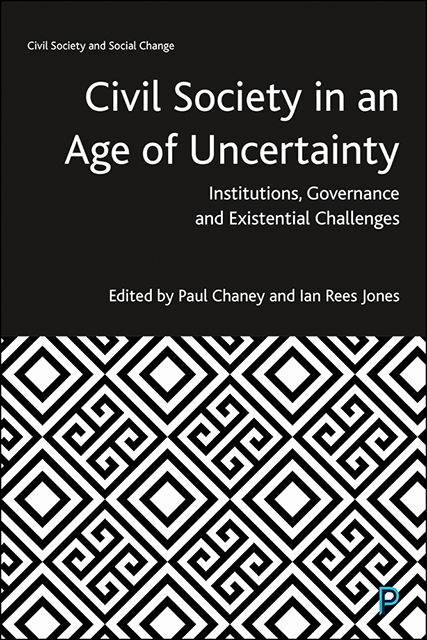Book contents
- Frontmatter
- Contents
- List of tables and figures
- Notes on contributors
- Acknowledgements
- 1 Introduction: Locating civil society
- 2 Existential challenges
- 3 Civil society and the governance of city region economic development
- 4 Civil society, pandemic and the crisis of welfare: exploring mixed economy models of welfare in domiciliary adult social care in a devolved UK
- 5 The contemporary threat to minority languages and cultures: civil society, young people and Celtic language use in Scotland and Wales
- 6 Digital threat or opportunity? Local civil society in an age of global inter-connectivity
- 7 Democratic decline? Civil society and trust in government
- 8 Xenophobia, hostility and austerity: European migrants and civil society in Wales
- 9 Meeting the challenge? Prospects and perils for civil society in the twenty-first century
- Index
4 - Civil society, pandemic and the crisis of welfare: exploring mixed economy models of welfare in domiciliary adult social care in a devolved UK
Published online by Cambridge University Press: 16 June 2023
- Frontmatter
- Contents
- List of tables and figures
- Notes on contributors
- Acknowledgements
- 1 Introduction: Locating civil society
- 2 Existential challenges
- 3 Civil society and the governance of city region economic development
- 4 Civil society, pandemic and the crisis of welfare: exploring mixed economy models of welfare in domiciliary adult social care in a devolved UK
- 5 The contemporary threat to minority languages and cultures: civil society, young people and Celtic language use in Scotland and Wales
- 6 Digital threat or opportunity? Local civil society in an age of global inter-connectivity
- 7 Democratic decline? Civil society and trust in government
- 8 Xenophobia, hostility and austerity: European migrants and civil society in Wales
- 9 Meeting the challenge? Prospects and perils for civil society in the twenty-first century
- Index
Summary
A burgeoning international literature charts the decline of traditional forms of state welfare provision, leading some to question whether the welfare state can survive (Gamble 2016). The UK is no exception to the wider trend. Over recent decades there have been significant cuts to welfare services (Edmiston 2017) and extensive outsourcing to the private sector. In part, this stems from the 1980s and 90s and the New Right attack on Keynesian welfare provision (McKevitt and Lawton 1994). Amid contemporary concerns over a crisis in state welfare provision (Rueda 2014), this chapter explores emerging evidence as to whether, in contrast to statist and market based ‘for profit’ service delivery, civil society is the answer to meeting modern welfare needs.
We examine one of the most pressing welfare challenges of the twenty-first century: adult social care (ASC). Reflecting this volume’s central theme of the uncertainties of the age, it examines the evidence on ASC delivery before and during the COVID-19 pandemic of 2020–21. It uses a comparative case study approach focusing on policy and practice in the four nations of the UK. This aligns with a burgeoning literature that has sought to analyse the decentralisation of the welfare state (Borghi and Van Berkel 2007; Chaney 2021). It is appropriate because devolution has created a natural experiment in welfare mixes. The analysis is based upon two WISERD ESRC-funded studies 2018–2021. The dataset comprises over one hundred interviews with civil society policy actors and other stakeholders, complemented by analysis of parliamentary proceeding, policy documents and the ‘grey’ literature of civil society organisations. The core research questions are: according to the views of key stakeholders, how do the different territorial welfare mixes on ASC in the four nations of the UK compare in their effectiveness? Did the four mixed economy models provide an effective response to ASC delivery in the pandemic? Does the evidence presented in the chapter exacerbate civil inequalities and social stratification? Last, can non-governmental organisations (NGOs) beneficially replace or complement the work of state ASC providers?
The term adult social care refers to non-medical support – including provision of social work, personal care, protection or social support services – to adults in need, typically arising from old age, disability and illness.
- Type
- Chapter
- Information
- Civil Society in an Age of UncertaintyInstitutions, Governance and Existential Challenges, pp. 54 - 86Publisher: Bristol University PressPrint publication year: 2022



